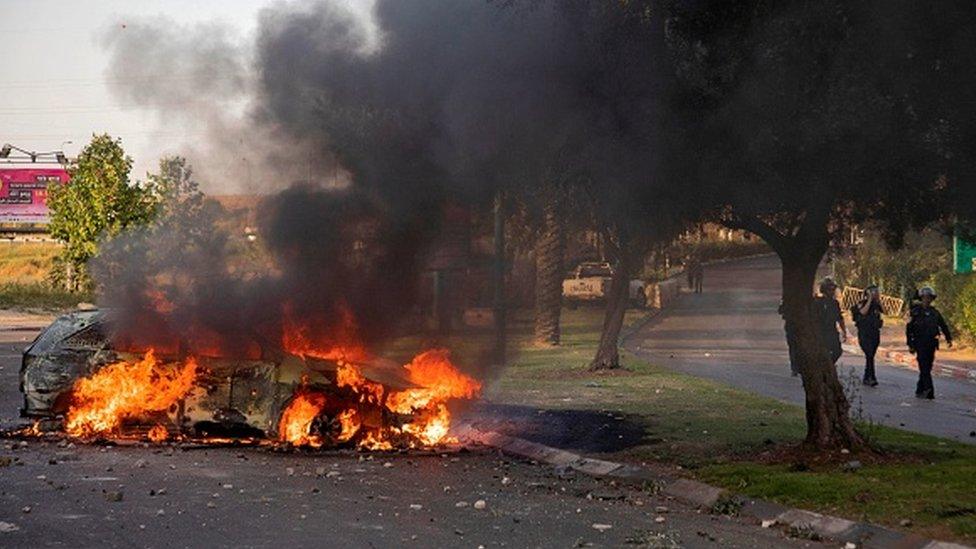United Nations calls for calm between Israel and Palestinians
- Published

An Israeli police car burns after an Arab Israeli demonstration following a funeral in Lod near Tel Aviv
Israel has declared a state of emergency in the city of Lod after violence continued, despite United Nations calls for calm.
There were riots in the city and, overnight, more rockets were fired by Palestinian militants into Israel, while Israel carried out more air strikes on Gaza.
It comes after the UK, the United States and the European Union appealed to Israel and the Palestinians to lower tensions, following days of unrest between the two sides. UN leaders are expected to meet again to discuss the situation on Wednesday.
Following clashes between Palestinians and Israeli police in Jerusalem, the violence has been escalating since Monday night, with Palestinian militants firing rockets towards Jerusalem and the Israeli army launching air strikes at targets in Gaza - which is ruled by a Palestinian militant group called Hamas.
The past few days have seen the worst violence for years.
Here's what's been happening
WATCH: Martin reports on the recent violence between Israelis and Palestinians
Tensions in East Jerusalem have risen since the start of the Muslim holy month of Ramadan on 13 April with many clashes between Palestinian groups, Israeli groups and police.
The latest rise in violence has come after Palestinians and Israeli police clashed in Jerusalem on Monday 10 May.
Palestinians accused the police of stopping them from congregating on steps outside Damascus Gate in East Jerusalem near to the Al-Aqsa mosque - which is an important holy site - to break their fast.
Israeli police officers arrest a Palestinian man in Jerusalem
Police say the measures were intended to help pedestrian flow into the Old City.
Many people were injured in the violence. Palestinians then fired rockets into Israel and the Israeli army responded with air strikes on targets in Gaza.
Violence has now spread to other cities with more attacks from both sides.
What have world leaders said?
Emergency services help an injured Palestinian protester
The international community has urged both sides to end the escalation.
UK Prime Minister Boris Johnson on Wednesday urged Israel and the Palestinians to "step back from the brink".
"The UK is deeply concerned by the growing violence and civilian casualties and we want to see an urgent de-escalation of tensions," he said on social media.
US Secretary of State Antony Blinken said rocket attacks must end "immediately", adding: "All sides need to de-escalate". The White House says US President Joe Biden is "seriously concerned" about the violence.
Smoke and flames rise above Gaza strip
The United Nations Security Council held an urgent meeting on Monday over the violence, with the UN's Middle East peace envoy, Tor Wennesland, saying he was worried the two sides were "escalating towards a full-scale war".
Why is this happening?
According to ґуПуґ«ГЅ Middle East expert Jeremy Bowen, there are long-standing reasons for the return of violence.
This was a crisis waiting to happen... Leaders on both sides have concentrated on safeguarding their own positions. The biggest challenge, of making peace, has not been addressed seriously for years.
It is part of the ongoing conflict between Jews and Arabs, which has gone on for generations, which largely began over who the land should belong to and how it should be divided up since the creation of the modern state of Israel in 1948.
WATCH: ґуПуґ«ГЅ Middle East expert Jeremy Bowen talks about the situation in Gaza (2018)
Why are there protests in Jerusalem?
Jerusalem is often at the centre of protests because the city is very important for religious reasons, and has many of the most important sites for Judaism, Islam and Christianity.
After a war in 1948 the city of Jerusalem ended up being split. Jordan was left in control of East Jerusalem, and Israel in control of West Jerusalem.
But after another war in 1967, Israel took control of the entire city and regards the whole of Jerusalem as its capital.
However, Israel's right to Jerusalem is not recognised by most governments. According to a 1993 agreement between Israel and the Palestinians, the final status of Jerusalem is meant to be decided in peace talks.
Palestinians want to have their own state, with East Jerusalem as their own capital.
